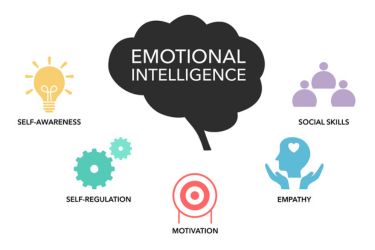Emotional intelligence plays a crucial role in how we resolve conflicts, both in our personal and professional lives. It allows us to understand our emotions and the emotions of others, giving us the tools to respond effectively when disagreements arise. By recognising and managing our feelings, we can turn potential conflicts into opportunities for collaboration and growth.

When we utilise emotional intelligence in conflict resolution, we improve our communication skills and foster empathy. This not only helps us to judge situations more clearly but also encourages respectful dialogue. As we become better at understanding differing perspectives, we enhance our overall performance in resolving disputes.
In a world where conflict is inevitable, emotional intelligence can lead to better outcomes. We can create stronger relationships and a more positive environment by prioritising this skill. This article will explore the ways emotional intelligence impacts our ability to resolve conflicts effectively.
Fundamentals of Emotional Intelligence

Emotional intelligence (EQ) is essential for effectively managing interpersonal relationships, especially during conflicts. We will explore its main components, the significance of self-awareness, and how social awareness shapes team dynamics.
The Components of EQ
Emotional intelligence consists of five key components:
- Self-Awareness: Understanding our own emotions and how they affect our thoughts and behaviour.
- Self-Regulation: The ability to manage and control our emotional impulses.
- Motivation: An internal drive to achieve goals and maintain a positive outlook.
- Empathy: Recognising and understanding the emotions of others, which forms deeper connections.
- Social Skills: Building relationships, resolving conflicts, and influencing others positively.
Together, these components help us navigate various social situations and foster healthier interactions.
The Importance of Self-Awareness in Conflict Situations
Self-awareness is crucial when conflicts arise. By recognising our own feelings, we can better understand our reactions. This understanding allows us to respond thoughtfully rather than impulsively.
When we are self-aware, we can identify triggers and work on our emotional responses. This skill helps in expressing our feelings appropriately and ensures that we do not escalate a situation unnecessarily. In conflicts, a high level of self-awareness enables us to take a step back and assess the dynamics of the situation clearly.
Social Awareness and Its Effects on Team Dynamics
Social awareness involves understanding the emotions and needs of others. It is vital for effective teamwork. When we practise social awareness, we can read the room and notice unspoken issues that may arise during conflicts.
By being attuned to our team members’ feelings, we can approach conflicts with sensitivity. This approach fosters an environment of trust. When team members feel understood, they are more likely to communicate openly. Improved communication can lead to quicker resolutions, preventing small issues from becoming larger problems. Ultimately, social awareness strengthens collaboration and builds stronger relationships within the team.
Emotional Intelligence in Leadership

Emotional intelligence (EI) plays a significant role in how leaders handle conflicts within their teams. We can see its impact through different leadership styles, its enhancement of leadership effectiveness, and the vital role of empathy in leading teams.
Influence of Leadership Styles on Conflict Resolution
Different leadership styles affect how conflicts are managed. For instance, a democratic leader often seeks input from team members. This approach encourages open dialogue, which can help identify issues early.
On the other hand, an authoritarian leader may make decisions without consulting the team. This can lead to unresolved conflicts and feelings of resentment.
Leaders with high EI tend to adapt their style based on the situation. They recognise when to take charge and when to listen, ultimately steering the team towards resolution.
How EQ Enhances Leadership Effectiveness
Emotional intelligence enhances leadership effectiveness by improving decision-making and fostering a positive team environment. Leaders with high EI can remain calm under pressure, allowing them to make better choices during conflicts.
They are skilled at reading emotional cues, which helps them understand team members’ feelings and perspectives. This understanding leads to informed decisions that consider everyone’s viewpoints.
Moreover, leaders who demonstrate EI build trust and respect within their teams. When team members feel valued and understood, they are more likely to engage openly, leading to quicker conflict resolution.
Empathy and its Crucial Role in Leading Teams
Empathy is a key component of emotional intelligence and an essential skill for effective leadership. When we empathise with our team, we create a safe space for open communication.
This openness allows us to identify and address potential conflicts before they escalate. Additionally, leaders who show empathy can tailor their responses to meet the specific emotional needs of their team members.
Empathetic leaders model behaviour that encourages collaboration and support. This not only strengthens team dynamics but also enhances our collective ability to resolve conflicts successfully.
Communication Skills and Conflict Management

Strong communication skills are vital for effective conflict management. By using clear techniques and recognising different styles, we can navigate disputes more successfully and work towards win-win solutions that benefit everyone involved.
Effective Communication Techniques for Resolving Disputes
We can improve our conflict resolution efforts by using specific communication techniques. Active listening is crucial; it allows us to fully understand the other person's perspective. This means giving our full attention, nodding in acknowledgment, and paraphrasing their points to show we appreciate their feelings.
Using "I" statements is another effective technique. Instead of saying, "You did this wrong," we might say, "I felt frustrated when this happened." This approach helps reduce defensiveness and opens the door for a constructive dialogue.
Additionally, remaining calm promotes resilience during conflicts. By keeping our emotions in check, we maintain clarity and focus on resolving the issue rather than escalating it. These techniques support our emotional intelligence and create an environment for positive outcomes.
Identifying and Understanding Various Conflict Management Styles
We often encounter different conflict management styles, which influence how we resolve disputes. The main styles are competing, accommodating, avoiding, compromising, and collaborating.
- Competing: This style involves a strong focus on winning, often at the expense of others. While it can bring quick results, it may damage relationships.
- Accommodating: This style prioritises others' needs over our own. Although it promotes harmony, it may lead to resentment if used excessively.
- Avoiding: This style involves sidestepping conflict, which can prevent resolution but may be useful in low-stakes situations.
- Compromising: This style seeks a middle ground. While it can produce quick agreements, it might not satisfy everyone's needs fully.
- Collaborating: This style focuses on finding solutions that benefit everyone. It's often the most effective way to resolve conflicts as it aligns well with emotional intelligence.
By understanding and recognising these styles, we can adapt our approach to conflicts and engage more effectively with others.
Building Collaborative Work Environments

Creating a collaborative work environment is essential for effective teamwork. By enhancing emotional intelligence (EI), we can improve team cohesion, facilitate compromise, and boost organisational performance. These elements play a vital role in how we manage conflicts and collaborate with one another.
Fostering Team Cohesion Through Emotional Intelligence
Emotional intelligence helps us connect on a deeper level. When we recognise our own emotions and those of our teammates, we can build trust and support.
To foster team cohesion, we can encourage open communication. Techniques such as active listening and validating feelings make team members feel valued.
Key strategies include:
- Regular check-ins: Create opportunities for team members to share thoughts.
- Team-building activities: Engage in activities that foster collaboration and understanding.
These approaches help us develop stronger bonds. Improved relationships lead to better teamwork and more effective conflict resolution.
The Art of Compromise in Team Settings
In any team, disagreements will occur. Emotional intelligence allows us to approach these situations with empathy and understanding. We must focus on finding common ground.
To achieve this, we can practice the following:
- Identify shared goals: Understanding our common objectives helps to clarify why we are working together.
- Be open to feedback: Encouraging a culture where everyone shares their views leads to better solutions.
With these strategies, we create a space where compromises can be reached. Effective compromise not only resolves conflicts but also strengthens teamwork.
Effects of EQ on Organisational Performance
Organisations that prioritise emotional intelligence see significant benefits. High EI leads to improved communication, which enhances collaboration across teams.
Benefits include:
- Higher productivity: Teams that can resolve conflicts quickly stay focused.
- Reduced turnover: Employees feel more satisfied and engaged, leading to lower attrition rates.
Investing in emotional intelligence training can significantly impact our overall performance. By embedding EI into our culture, we can drive continuous improvement and success within our organisation.
Enhancing Resilience and Managing Work-Related Stress
To effectively deal with work-related stress and prevent burnout, we must focus on developing resilience and implementing strong stress management techniques. Building these skills can significantly improve our ability to navigate conflicts and maintain a harmonious work environment.
Strategies for Reducing Burnout Among Employees
To reduce burnout, we can adopt several effective strategies. First, promoting a healthy work-life balance is essential. Encouraging flexible working hours allows employees to manage their personal and professional lives better.
Second, implementing wellness programmes can foster a supportive workplace. These programmes may include fitness initiatives, mental health days, or mindfulness workshops.
Third, enhancing communication is vital. Regular check-ins and feedback sessions can help employees express their concerns, making them feel valued and heard. This creates a culture of empathy and support, which is crucial for resilience.
Lastly, we should focus on professional development. Providing opportunities for skill-building can empower employees, reducing feelings of inadequacy and frustration.
Stress Management and Its Impact on Work-Related Conflicts
Effective stress management plays a crucial role in minimising workplace conflicts. When we manage stress well, we are less likely to react impulsively during disagreements. Self-awareness allows us to recognise our stress triggers and respond calmly to challenging situations.
We should also develop our social skills to enhance our interactions with colleagues. Practising active listening helps us understand others’ viewpoints, reducing the chances of misunderstandings.
Additionally, applying techniques such as mindfulness and relaxation exercises can help us stay centred. Regular pauses for deep breathing or short walks can clear our minds, enabling us to approach conflicts with a fresh perspective.
By cultivating these skills and strategies, we create a workplace that supports each other, ultimately leading to a more resilient and productive environment.
Training and Development in Emotional Intelligence
Effective training in emotional intelligence (EQ) can greatly enhance workplace dynamics. We can improve job performance, engagement, and innovation by focusing on tailored EQ training programmes. Additionally, fostering diversity and inclusion through EQ training helps create a more cohesive and supportive environment.
Designing Effective EQ Training Programmes
To design impactful EQ training programmes, we focus on practical learning experiences. This involves using role-playing, simulations, and real-life scenarios that employees might face.
We can outline several key components in our training programmes:
- Assessment Tools: Use EQ assessments to identify personal strengths and areas for growth.
- Interactive Sessions: Incorporate group discussions and activities to enhance engagement.
- Feedback Mechanisms: Provide ongoing feedback to reinforce learning and encourage application.
Integrating these elements can lead to a significant improvement in teamwork and collaboration within our organisation. Tracking progress through performance metrics can also show the benefits of EQ training over time.
Encouraging Diversity and Inclusion Through EQ
Encouraging diversity and inclusion is crucial for us in today's workplace. We can support this by embedding emotional intelligence training into our diversity initiatives.
Key strategies include:
- Cultural Competence: Teach employees to appreciate and respect diverse backgrounds and perspectives.
- Empathy Training: Foster empathy skills to help navigate different cultural contexts and experiences.
- Inclusive Practices: Promote inclusive dialogue and teamwork to ensure everyone's voice is heard.
This approach not only enhances our workplace culture but also drives innovation. By creating an environment where diverse ideas are valued, we can improve problem-solving and decision-making within our teams.





















